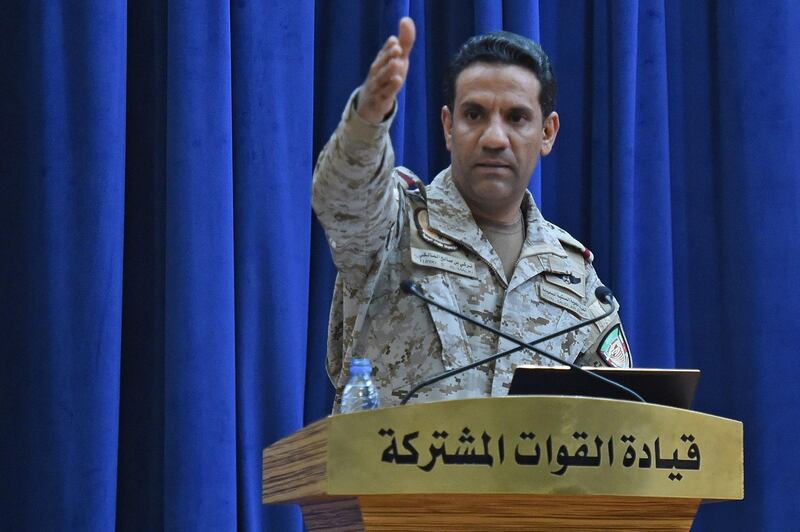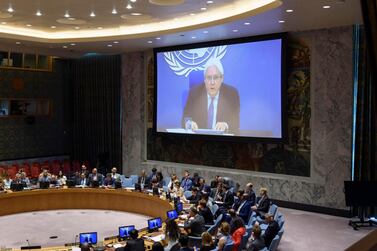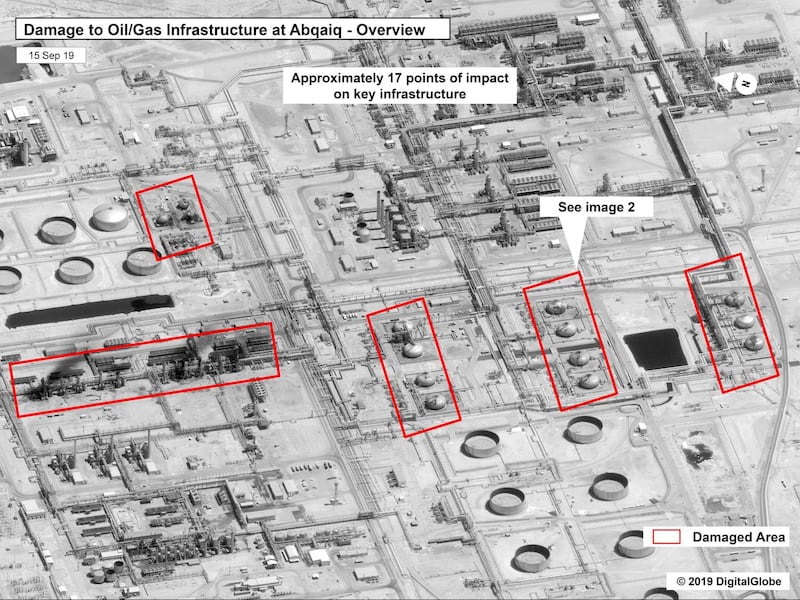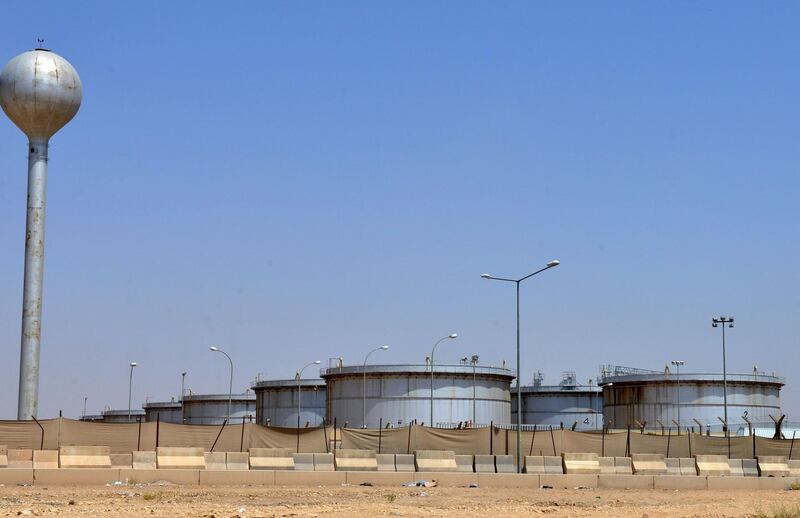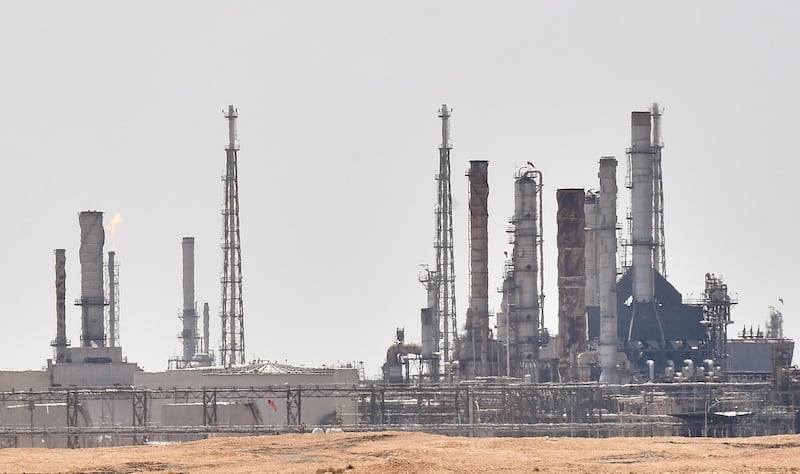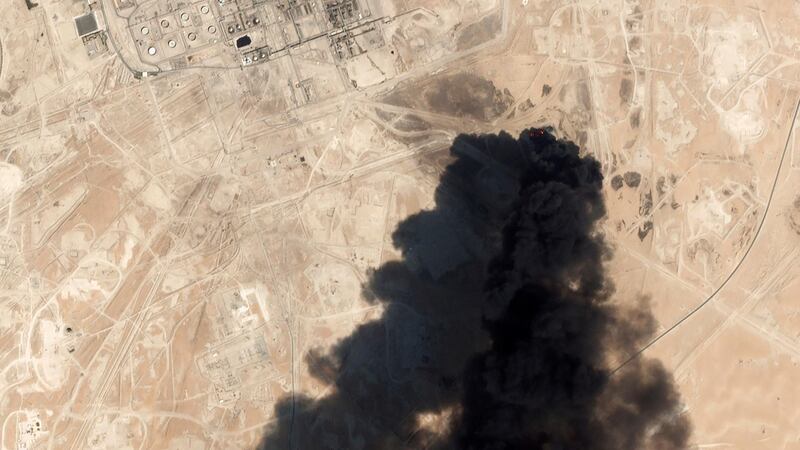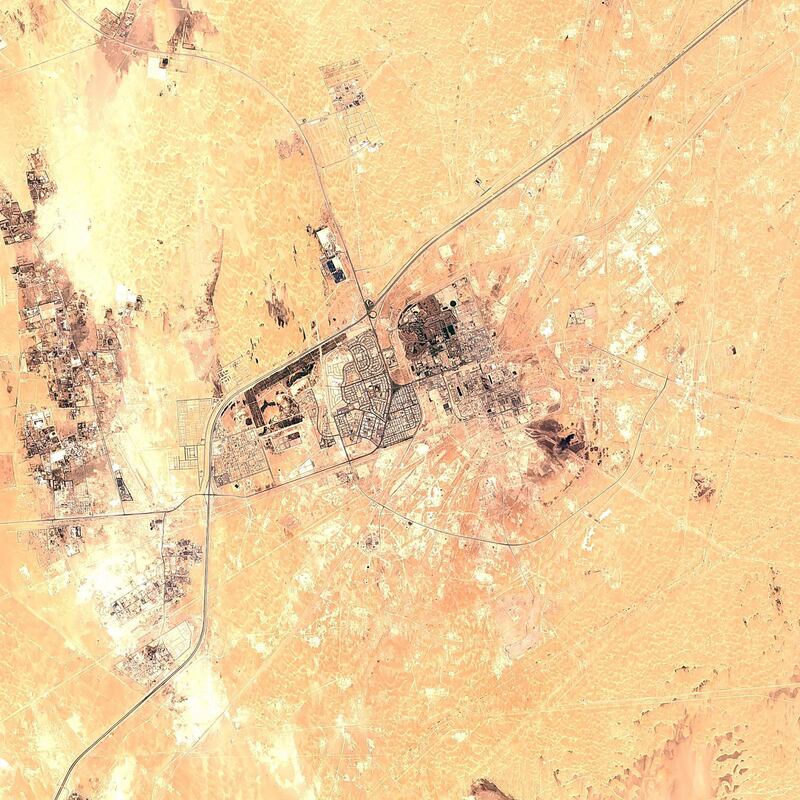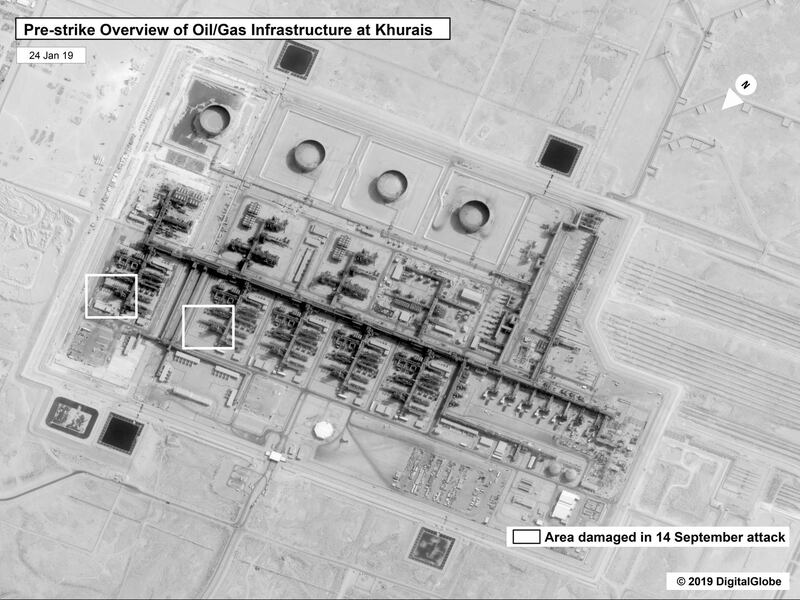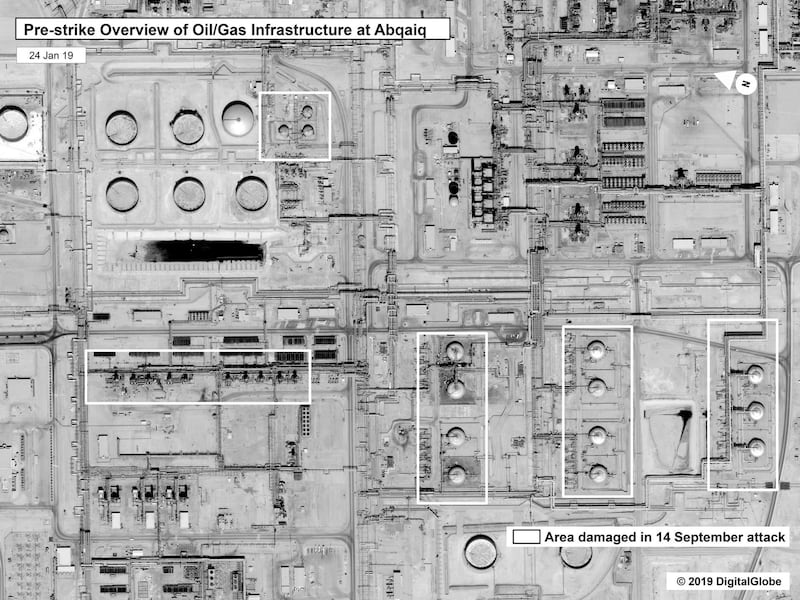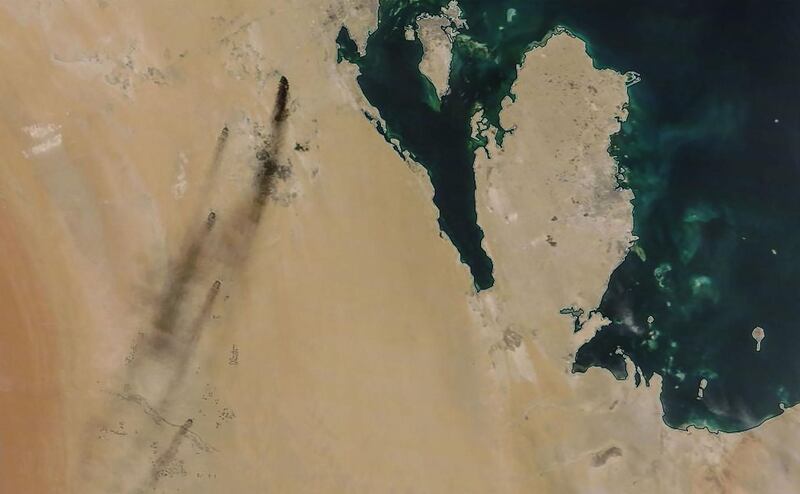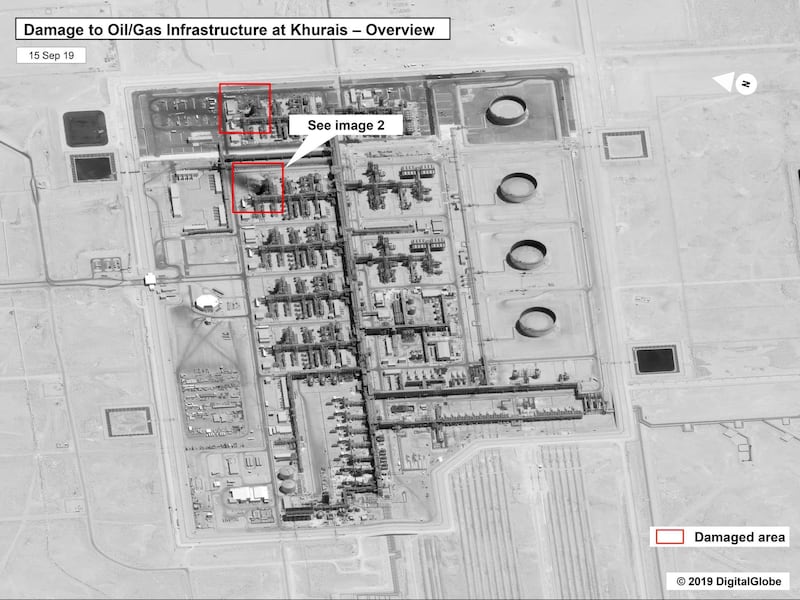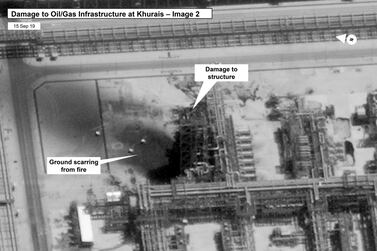Preliminary findings show the weapons used to strike Saudi oil plants were made by Iran, the Arab Coalition said on Monday.
The statement came hours after Iran claimed it had seized another vessel and its crew near the Strait of Hormuz.
Saudi Arabia's Foreign Ministry said later on Monday evening that the initial investigation into Saturday's strikes had indicated Iranian weapons were involved.
"The kingdom condemns this egregious crime, which threatens international peace and security, and affirms that the primary target of this attack are global energy supplies, as it is in line with the previous attacks against Saudi Aramco pumping stations using Iranian weapons," the ministry said.
Coalition spokesman Col Turki Al Malki said the investigation was continuing into the launch site of the attacks, which had been claimed by the Iran-backed Houthi rebels in Yemen.
"The preliminary results show that the weapons are Iranian and we are currently working to determine the location," Col Al Malki said in Riyadh.
"The terrorist attack did not originate from Yemen as the Houthi militia claimed."
The explosions, which took place on Saturday, set off fires that engulfed the Abqaiq plant, the world's largest oil processing plant, and nearby Khurais, which has a massive oilfield.
Col Al Malki said authorities would reveal the location from which the drones were launched at a future briefing.
Meanwhile, Iran seized another vessel and its crew near the Strait of Hormuz on Monday, the semi-official Iranian news agency Fars reported.
It said the vessel was carrying "smuggled diesel" and that its crew of 11 had been arrested.
"The ship, called Linch, sailed from the port of Lankah and was heading towards the UAE," an Islamic Revolutionary Guard Corps naval commander told the agency.
"It was stopped about 20 miles [30 kilometres] east of the island of Tunb."
The islands of Abu Musa and the Greater and Lesser Tunbs, a few kilometres off the UAE coastline, are regarded as strategically important points in the Strait of Hormuz, and were seized by Iran in 1971 on the eve of the UAE's formation.
If the ship seizure is confirmed, it would represent the latest move by Iran to hamper navigation in the waterway, one of the most vital routes for global energy supplies.
The US has blamed Iran for a series of attacks on oil tankers. Iran has seized at least one British-flagged tanker and approached another.
Washington withdrew from a nuclear deal signed between Iran and world powers in 2015.
It imposed two rounds of crippling sanctions on the Iranian economy to disrupt its malign activity across the Middle East.
Iran has proxies operating in Lebanon, Yemen, the Gaza Strip and Syria.
State television broadcast footage from the deck of a trawler-sized vessel with open hatches showing tanks full of what appeared to be fuel.
It is the second such seizure this month, after a boat Iran claimed was smuggling fuel was detained and its 12 Filipino crew members arrested in the Strait of Hormuz on September 7.
US officials earlier indicated that Iran was behind the weekend attacks. Iran denied any responsibility.
US officials released satellite images of the damage at the heart of the kingdom's crucial Abqaiq oil processing plant and Khuraisa oilfield.
They claimed the pattern of destruction suggested Saturday's attack came from either Iraq or Iran, rather than Yemen.
In a tweet before the coalition’s announcement, US President Donald Trump said his country was primed to respond after the attacks that threatened global oil supplies.
“There is reason to believe that we know the culprit," Mr Trump tweeted on Sunday.
"We are locked and loaded depending on verification, but are waiting to hear from the kingdom as to who they believe was the cause of this attack, and under what terms we would proceed.”
Earlier on Sunday, US Secretary of State Mike Pompeo accused Tehran of carrying out the strikes, saying there was “no evidence” the drones had come from Yemen.
China on Monday urged the US and Iran to exercise restraint, with Foreign Ministry spokeswoman Hua Chunying saying it was not responsible to accuse others "in the absence of a conclusive investigation or verdict".
India and Britain condemned the attacks without apportioning blame.
A US official said there were 19 points of impact in the attack on the Saudi plants, and that evidence showed the launch area was west-north-west of the targets, not south from Yemen.
Iraq denied on Sunday that its territory had been used to carry out the attacks. Prime Minister Adel Abdul Mahdi received a call from Mr Pompeo on Monday, but his office did not specify what was discussed.
Saudi Aramco said the production of 5.7 million barrels of crude a day had been suspended after the attack but that work was under way to restore production.
A spokesman for the Houthi rebels, Yahia Sarie, said 10 drones had attacked the Aramco plants and more strikes were to be expected.
Mr Trump authorised the release of oil from the US's emergency oil reserves after the attacks knocked out half of the kingdom’s crude output.
In tweets, the president said the amount of oil released would be “sufficient to keep the markets well supplied”. He later said: “Plenty of oil.”
Sheikh Mohamed bin Zayed expressed the UAE’s solidarity with the kingdom in a phone call with Saudi Crown Prince Mohammed bin Salman on Sunday.
The Crown Prince of Abu Dhabi and Deputy Supreme Commander of the Armed Forces reaffirmed the country’s support for all of the measures taken by the kingdom to ensure the security and safety of its citizens, and all of those living on its soil.
“UAE and Saudi Arabia are standing as partners in facing besetting challenges. Our shared goals are the security of our nations," Sheikh Mohamed said in comments reported by Wam.
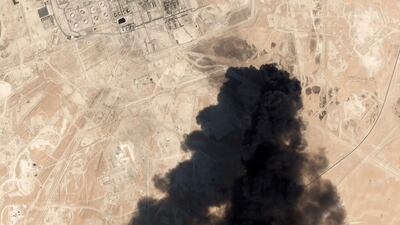
Mr Trump called Prince Mohammed on Saturday to affirm his country’s "readiness to co-operate with the kingdom by all means to maintain its security and stability", the Saudi Press Agency reported.
As tension continues to rise between Washington and Tehran, Mr Trump has left open the possibility of meeting Iranian President Hassan Rounani.
But Iran on Monday ruled out any hope of that happening at the UN General Assembly in New York next week.
"Neither is such an event on our agenda, nor will it happen. Such a meeting will not take place," Foreign Ministry spokesman Abbas Mousavi said. Tehran has repeatedly rejected such a meeting.
Mr Mousavi rejected as "nonsense" remarks by the Republican Senator Lindsey Graham that it was time for the US "to put on the table an attack on Iranian oil refineries".
